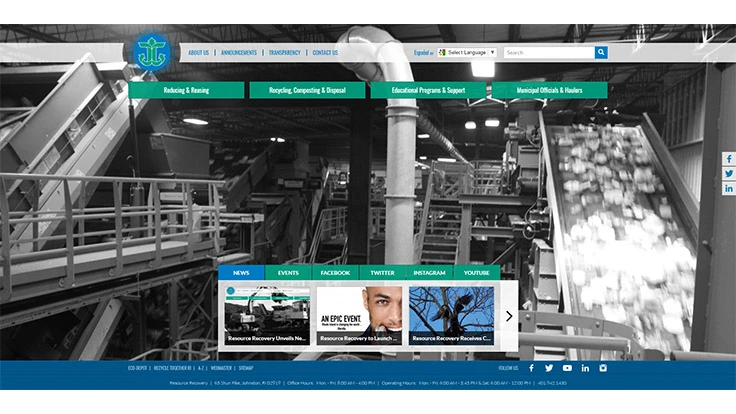
Rhode Island Resource Recovery Corp., Johnston, Rhode Island, has launched a new, redesigned version of its website, www.rirrc.org, which it says features a modern and simplified design, easier navigation and mobile optimization for easy viewing on any device.
"We are thrilled to introduce our newly designed website,” says Krystal Noiseux, education and outreach manager at Resource Recovery. "Our goal is to see Rhode Islanders having the same great customer experience when they visit our website as they do when they visit us in person or participate in any of our programs.”
The goal of the redesign—led by Resource Recovery in partnership with Ntirety—was to create a visually appealing website that makes high-demand resources available with a few clicks, Resource Recovery says. The navigation mirrors the traffic trends of Resource Recovery’s most frequent visitors: Rhode Island residents, teachers and group leaders, municipal officials and commercial waste haulers, the agency says. New contact forms are designed to enhance Resource Recovery’s ability to expand and improve programs and services over time. Students and other researchers also will have access to information about the quasi-public agency and its central waste management operations.
The new homepage features a content block that highlights real-time social media posts, upcoming events and press releases. In addition, a translation feature allows users to select one of 22 languages or access www.rirrc.org/espanol, where Spanish-speaking Rhode Islanders can download professionally translated resources. The new website was built using Drupal 8, an open source content management system (OSCMS).
With the redesign of the website, Resource Recovery also unveiled its updated recycling guidelines. In 2016, Rhode Island became the first state in the nation to adopt standardized recycling bin labels from Recycle Across America (RAA). In partnership with RAA, Resource Recovery developed basic recycling guidelines, available in English and Spanish, to match the labels. In addition to being available on the website, these guidelines will be distributed in all of Resource Recovery’s educational programs and via direct mail to Rhode Island households during summer 2017. When Rhode Islanders follow these basic guidelines, they will produce quality recycling without having to master every nitty-gritty detail, the agency says. Rhode Islanders seeking a more detailed level of recycling instructions—including tips for preparation—can access detailed guidelines on the website, too.
“Choose the kind of recycler you want to be,” Noiseux says. “Follow the basic guidelines, and you’ll be a great one. Go for the detailed guidelines, and you’ll reach ‘super recycler’ status.”
Resource Recovery is the quasi-public agency dedicated to providing Rhode Islanders with waste and recycling services. The agency operates the state’s materials recycling facility, leaf and yard compost, eco-depot, and central landfill and provides free programs and services to help the Rhode Island community manage materials more sustainably.
Latest from Waste Today
- Mount Vernon, Ohio, city council tightens waste hauling regulations
- Retail associations sign MOU to form producer responsibility organization for textiles in California
- Republic Services partners with EDL to provide RNG for San Antonio buses
- WM opens 12 recycling facilities in 2024
- Plastics recyclers report difficult conditions
- BTS Bioenergy opens Maryland Organics Recovery Center
- Meadow tabs aluminum as key to boosting beauty sector recycling
- LFG-to-energy: Maximizing returns with multitiered methane monitoring





